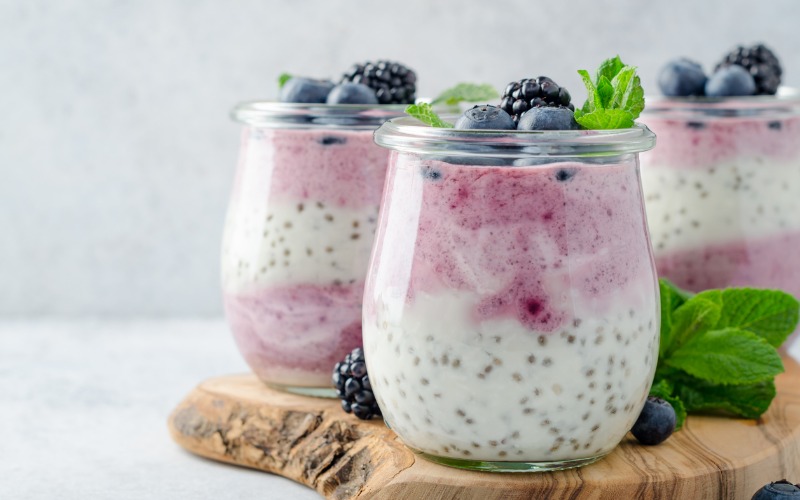When it comes to keto, a primary focus of the diet is to avoid sugar. As such, the sugar-free industry has experienced meteoric growth. There are now sugar-free versions of practically every food imaginable. There are sugar-free lollipops, sugar-free gummies – seemingly sugar-free everything. But in place of sugar, what exactly is being used to make these foods taste so sweet?
Enter the artificial sweetener. There is a whole industry of sugar-free sweeteners which have stepped in to make keto sweets and treats. However, there are also sugar alcohols. While sugar alcohols are technically found in nature, they’re now mass-produced to be enjoyed by the consumer. One of the most popular non-sugar sweeteners available is erythritol.
Erythritol provides no calories, is nearly as sweet as sugar, and has no questionable aftertaste (we’re looking at you, stevia). It is also sometimes used to make other sweeteners as part of a multi-ingredient blend.
We here at Biosense love the keto diet, and we also recommend you regularly track your ketones to monitor your fat burn experience. However, avoiding sugar is absolutely critical to fat burn success on keto, so let’s get started with this complete guide to one of the best sugar substitutes on the market.
What Is Erythritol?

Erythritol is a sugar alcohol, which is a term you may already be familiar with. Many food manufacturers routinely use sugar alcohols in their products, and other commonly used variations include maltitol, sorbitol, and xylitol. As you may have guessed, these sugar alcohols are used mainly as sugar alternatives in low-sugar and sugar-free products.
Sugar alcohols are actually an interesting substance. Larger food companies mostly use them for processed foods, but they also occur naturally. When it comes to mimicking sugar, sugar alcohols are actually molecularly similar to the white stuff – which is how they are able to provide a familiar taste. However, erythritol is unique from sugar in a number of important ways.
How Is It Made?
Erythritol is most commonly produced in a lab or factory via a fermentation process. Dextrose, a form of sugar that comes from corn, is processed to deliver erythritol. First discovered in 1848, it did not become commercialized until the 1990s, so it is a relatively new compound.
There have been many scientific studies completed on the safety of erythritol, and none have shown any adverse side effects. While some artificial sweeteners and sugar alcohols have been tied to problematic outcomes, erythritol has a very clean track record.
Calories in Erythritol
Erythritol does not break down in the body and has far fewer calories than many other sugar alternatives. For comparison, table sugar has around four calories per gram. Another option, xylitol, contains 2.5 calories per gram. But erythritol contains just 0.2 calories per gram.
Sugar withdrawals are most pronounced at the beginning of carb-restricting weight loss regimens, so it can be helpful to still have a moderate amount of sweetness in your foods at the start. Because erythritol is so low in calories, it is often referred to as a “zero-calorie sweetener.” While this label is technically not true, erythritol really does not contain any significant amount of calories. For this reason, if you are making a meal plan, you do not need to add any additional calories for any entries containing erythritol.
Erythritol and Blood Sugar
Because erythritol does not get broken down by the human body, it also does not have an impact on blood sugar. This makes it a great fit for people with diabetes, as well as anyone else looking to control blood sugar. As a popular sweetener, erythritol has been tested many hundreds of times in scientific environments.
The results from these tests show that erythritol has no impact on human insulin levels, no impact on cholesterol levels, triglyceride levels, or any other relevant health factors. Erythritol is simply consumed and then passed out of the body via urine.
When it comes to the glycemic index, erythritol has a score of zero. This is great news, as most other sugar alcohols rank much higher.
Comparatively, sorbitol is the lowest, with a score of four on the glycemic index. Xylitol is three times that with a score of 12 on the glycemic index. And if you are looking to have a low impact on your blood sugar, you will likely want to avoid using maltitol, which has a glycemic index score of 35.
Among the sugar alcohols, erythritol seems to be the least impactful of all sweeteners, and yet it still adds a perfectly sweet taste to any food you can dream up. A true ‘win-win’ situation.
Erythritol and Oral Health
Sugar alcohols have been shown to aid with oral health. Specifically, erythritol stops the growth of certain oral bacteria, particularly streptococcus mutans, a bacteria associated with cavities.
Because it contains no sugar, offers a sweet taste that can be used as a 1/1 replacement for sugar in recipes, and actually benefits oral health, erythritol is also a popular choice amongst dentists. Even the FDA has labeled erythritol as beneficial to oral health.
Erythritol and Heart Disease
Heart disease is a daunting condition, and unfortunately, rates of heart disease continue to climb. In some studies, erythritol has improved the function of blood vessels, which suggests it may help work against developing heart disease. However, much more research is needed before anything definitive about erythritol and heart disease can be said.
Erythritol in Foods
Erythritol is found naturally in foods, which means it is not technically classified as an artificial sweetener. You can find this sugar substitute in peaches, pears, watermelons, grapes, mushrooms, cheese, sake, soy sauce, and even in wine. In food products, erythritol is used for everything under the sun, including making chocolate, gum, beverages, baked goods, and candy.
Powdered Erythritol: Is It the Best Choice?
Erythritol comes in many shapes and sizes but is most commonly sold in powdered form. However, is this the best choice? It is certainly the most popular.
Powdered erythritol is better for baking, as you will not want large crystals of granulated erythritol in your tasty desserts. Powdered erythritol also mixes easier in your coffee or any other beverage you’d like to make keto-friendly. Additionally, powdered erythritol works in a wider variety of recipes and mixes in far better, so we recommend it for just about anything.
If you want to make your own powdered erythritol, it’s a very easy process. Simply buy the granulated version, and use a coffee grinder to turn the crystals into powder. Powdered erythritol tends to be more costly than the granulated variety, so grounding your own will be sure to save you money.
Erythritol vs. Stevia
Stevia is another popular sugar alternative. This sweetener provides a great way to avoid sugar and is actually one of the most commonly used sweeteners in the United States. Stevia is actually a little more natural when it comes to how it’s made, compared with erythritol.
Stevia is also similar to erythritol in many ways. Stevia is a very sweet plant and it is used in largely the same way – to sweeten foods that lack real sugar. The earliest use of stevia dates back to the 16th century, as Stevia was traditionally used to sweeten tea as well as other beverages.
Stevia is native to Paraguay and Brazil, but many other countries now grow it. If you are adding Stevia to a food these days, it was likely made in China or Japan.
Stevia is a good alternative for those looking to avoid sugar, but it does have its downsides. For one, it is intensely sweet. Stevia is 300 times sweeter than sugar, to be exact. This makes it potentially far too sweet to use for many applications.
Secondly, many find there to be a strange aftertaste to Stevia, with a common description being “bitter.” In fact, some people find it so bitter that they usually needs to mix Stevia along with other sugar alternatives for use in food.
Third, Stevia cannot be used as effectively for baking or cooking. You will most probably need to mix it with another artificial sweetener to yield a tasty result. Erythritol, on the other hand, can be used as a one-to-one replacement for sugar in any recipe.
Thus, we give the nod to erythritol. It is easier to use on a daily basis, has no aftertaste, and does not need to be combined with any other sugar-free sweeteners.
Side Effects
Erythritol has shown no significant side effects, but there is one area to be mindful of. Digestive issues, especially in those consuming very large amounts, have been occasionally reported. This is due to the fact that about 10% is not absorbed into your bloodstream, but is instead processed by your colon.
Interestingly, the scientific studies also show that erythritol is somewhat unique in that it is not fermented by colon bacteria. Still, the data shows that only in very large amounts – far beyond what anyone is ever likely to consume – does erythritol cause any potential stomach issues.
Is It Safe?
Erythritol has been used in many scientific trials, as well as by millions of people in their everyday lives, and by all accounts, it appears to be safe. Even when used long-term, high amounts of erythritol have shown no adverse effects. As already mentioned, digestive issues are the only potential thing to look out for, but if you do not over-consume it, you will likely have nothing to worry about.
Erythritol and Keto
Erythritol has become one of the most popular alternative sweetener options for any low carb or keto dieter. It is commonly recommended because it does not impact blood sugar and contains no calories. You can safely consume it on a keto diet, and some of our favorite keto sweeteners may already contain erythritol (like Swerve).
In Conclusion…
Erythritol is a great alternative to sugar. It contains no calories, does not impact blood sugar, and can be used as a 1/1 replacement for sugar in recipes. You can safely use it for baking and cooking.
If you are following a low carb diet, we highly recommend it for any sugar replacement needs you may have. If you want to take the next step and go keto, erythritol is a perfect choice for “sweetening” your foods while still staying in fat burn.
If you are looking to track your progress on a keto diet, we also have a great solution for you. To allow for an effortless, accurate, and non-invasive way to measure ketosis, we invented the first and only clinically-backed ketone breath monitor. Our device is accurate enough to replace invasive, costly blood measurements. By simply breathing into our device, you will have a reliable measurement of your current ketone levels in seconds.
No more urine strips, no more pricking your finger – just a fast, easy and reliable breath test. You can bring our device with you to the office, take it to the gym – you can truly check your ketones anywhere.
Unlike previous devices, which were often poorly made, unreliable, and not backed by clinical research – our ketone breath monitor is patented. This means no other device is legally allowed to use our exclusive technology. Whether you are brand new to keto and want a convenient and reliable way to check your ketone levels, or you’re an elite level biohacker – we are the perfect way to measure your ketones.



